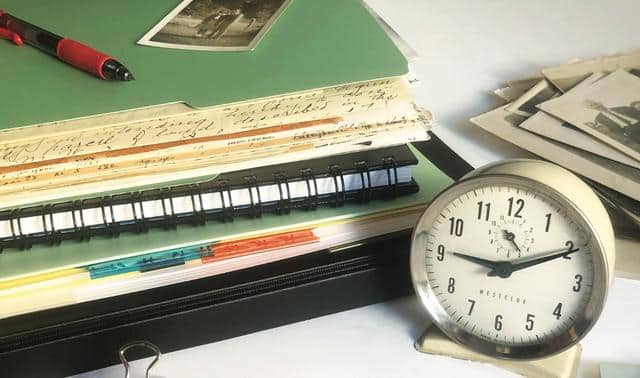We genealogists are busy. Hours are eaten away chasing down ancestors online, scanning pictures, inputting data and citations into genealogy software, documenting family stories and scouring social media for cousin connections.
These days it seems like cloud-based resources cover just about any aspect of genealogy research, from family tree building to cemetery research. But family history investigation also requires you to take notes, share files, maintain unwieldy to-do lists and write down ancestors’ stories. Fortunately, the following mostly free apps and tools can help you manage the menagerie of tasks that scuttle across your computer screen. Accessible from anywhere with an internet connection, these handy programs and apps (each is primarily free unless indicated by a $) work across platforms and devices to keep critical “genea-data” right at your fingertips.
Day One Journal $
Many writers like to keep a diary or journal, with entries serving as a head start of a memoir. Day One Journal takes the diary concept virtual. This easy-to-use app works well for brainstorming ideas or listing memories as they come to you (for example, “Grandma Elizabeth died,” “my parents divorced,” or “first kiss”). At any point, you can effortlessly search through your entries, share them via email or sync through Dropbox (see the next tool). The app also allows you to tag entries by subject and upload photos. It’s sure to move your memoir forward and makes it easy to turn your notes into a book. It’s available for Mac ($9.99) and iPhone/iPad ($4.99), but Android users might like the similar Day Journal app available through the
Google Play store.
Dropbox
This online data repository offers file-sharing and synchronization. When you download and install the application to your desktop, you can drag and drop files into Dropbox folders and the contents sync to the cloud. The free version starts you out with 2GB storage, but you can earn more by inviting others to sign up, or you can upgrade to Premium for $5 per month. With Dropbox, you can access uploaded files, such as scanned records or a research log, from various devices, or you can share a folder of documents with another researcher. Use Dropbox to protect your precious research: If your hard drive gets fried or you spill coffee on your iPad, all that work will remain easily retrievable.
Evernote
Dedicated genealogists are always collecting information: digitized census records, old photos of Great-grandma Imogene,
Ancestry.com source citations, the best websites for Polish genealogy. Evernote is an online notebook where you can upload information, photos and articles clipped from websites. Build notebooks organized by surname, family line or specific ancestors. All the notes you create are keyword searchable, making it easy to pull a specific bit of information right out of the haystack. The program works on Windows and Mac platforms, as well as tablets and most smartphones, and offers easy syncing across devices. The free version should be adequate for most users, but if you want more flexibility, additional storage space or other features, the Premium version costs just $45 per year.
Photobucket is a free multimedia hosting website. It’s particularly useful for storing media such as photos or videos you want to embed on your genealogy blog or import into another program, such as Google Earth. Connect your account to Facebook and Twitter for effortless photo sharing, and don’t forget to download the Photobucket mobile app to access your account on the go.
SplashTop2 Remote Desktop ($4.99 for iPad, free for iPhone and Android) lets you remotely access your desktop computer from your mobile device. This app will revolutionize your “tablet life” by helping you retrieve and view files stored on your home computer while you’re researching on site at a library or archive. You even can use it to show the family photos on your hard drive to relatives at your next gathering. To use SplashTop, your home computer must be turned on, connected to the Internet and have the free SplashTop Streamer installed.
This cloud-based tool is ideal for anyone who’s a fan of using old-fashioned index cards for organization. Just set up a free account and you can manage your genealogy in a glance, without the lengthy email threads, hard-to-use spreadsheets, sticky notes and paper scraps. Trello is like Pinterest for personal organization: You can set up different “boards,” each of which holds a collection of cards containing your notes. For example, you could have one board for each surname you’re researching, another for a family history book project and one for each genealogy conference you attend. Trello is an ideal tool for collaboration, whether you’re working with a cousin or a genealogy society committee, because you can easily add members to a board for group projects.
uCreate is like a miniature whiteboard for your iPhone or iPad. It costs just 99 cents, and is ideal for brainstorming research tasks, diagramming confusing family connections, mind mapping your brick wall problems and jotting down ideas for your family history writing project. Choose from a variety of pen colors. Make a mistake? Simply use the digital eraser, just as you would on a regular whiteboard. When finished, easily save your creation to your device’s Camera Roll or Gallery, where you can share it via email or Facebook, or upload it to an Evernote Notebook. You even can play a quick game of Tic-Tac-Toe or Hangman inside the app.
This free, web-based program offers a “distraction-free” writing space in the cloud, without the sometimes confining utilities and formatting of traditional word processing software. Full-screen mode spans your entire monitor, edging out unnecessary toolbars and menus to command your complete attention. Notes are private by default and encrypted for additional security. Want to share your thoughts with the world? Opt to make your note public. You also can save notes as a TXT file to open in other processors. It’s the perfect program for combating writer’s block or to block out diversions keeping you from important family history documentation.
From the May/June 2015 Family Tree Magazine




